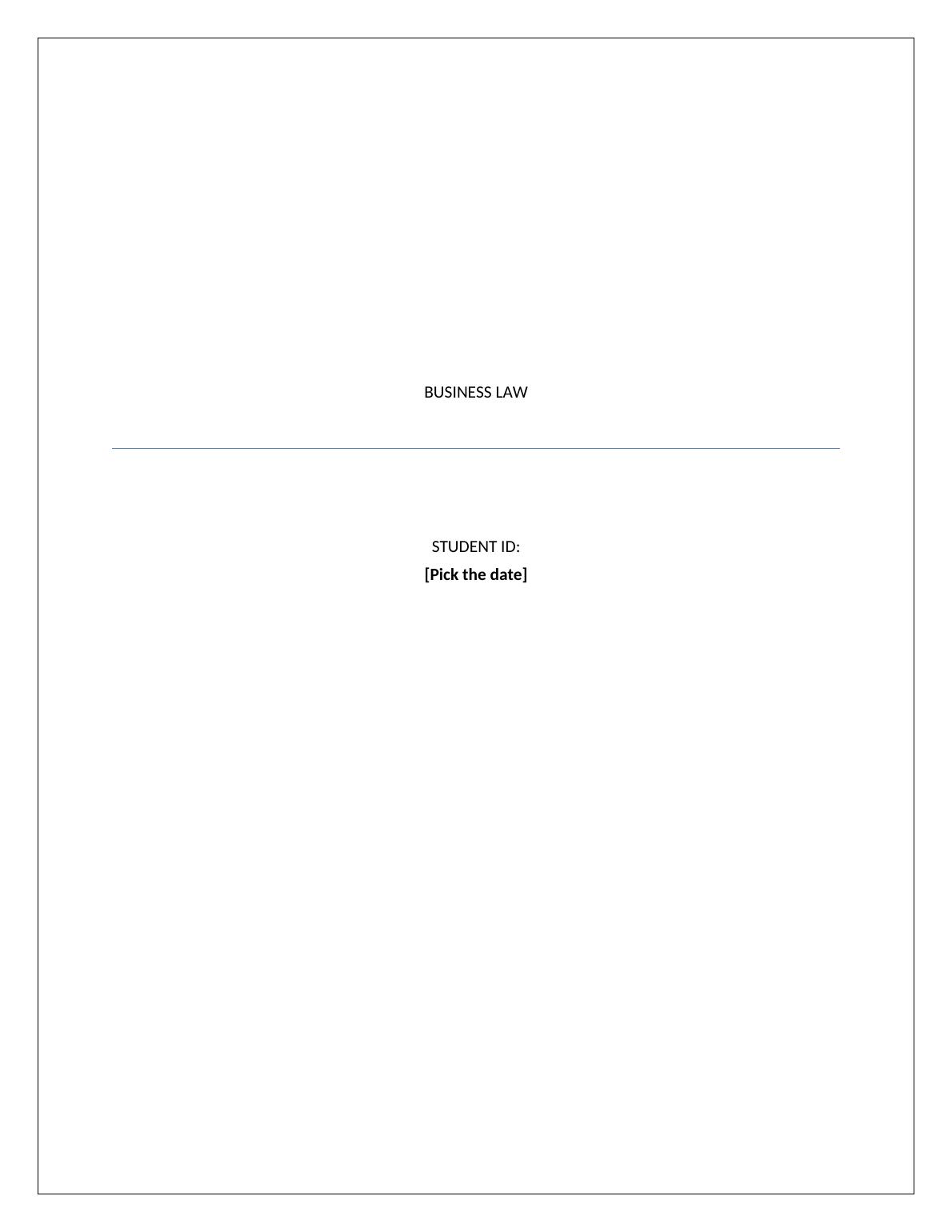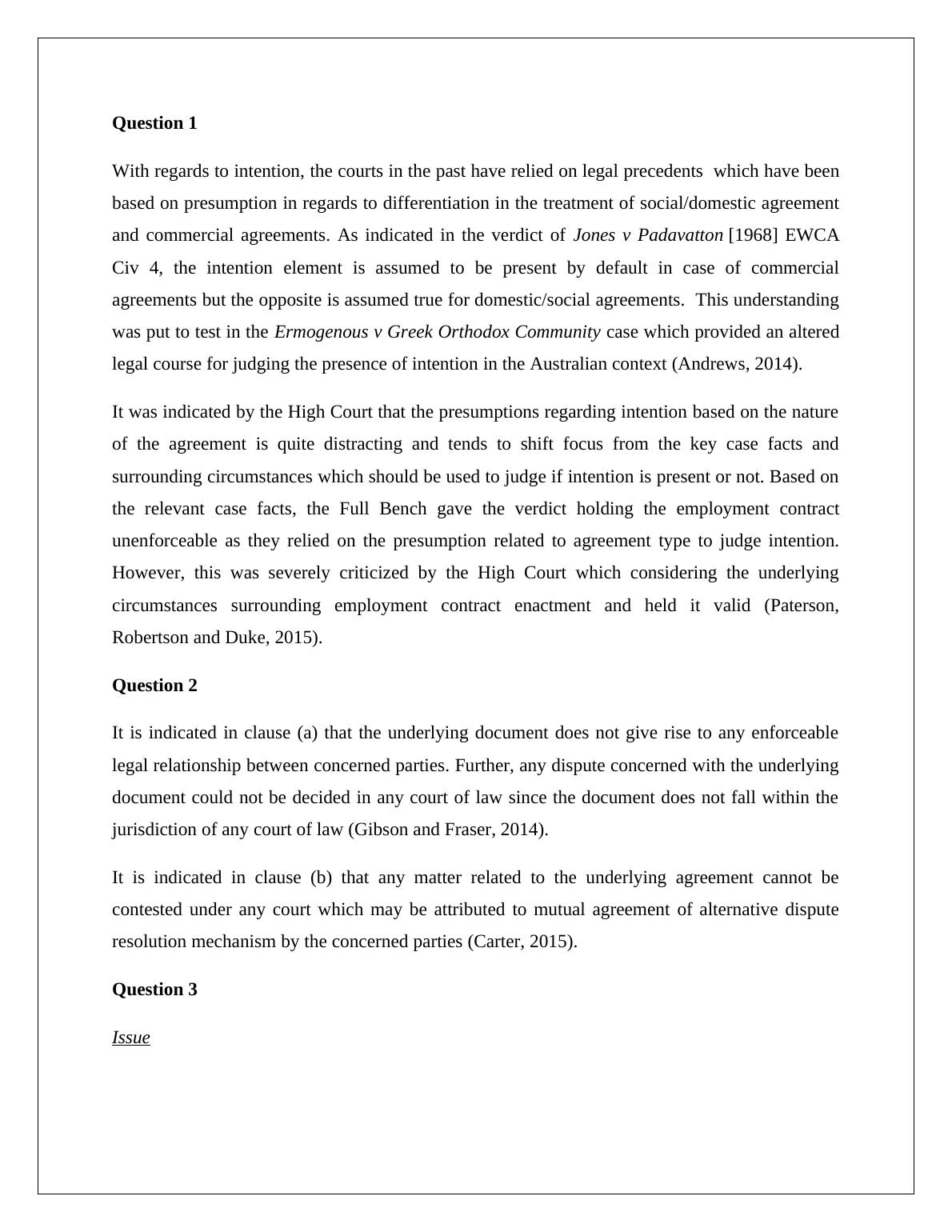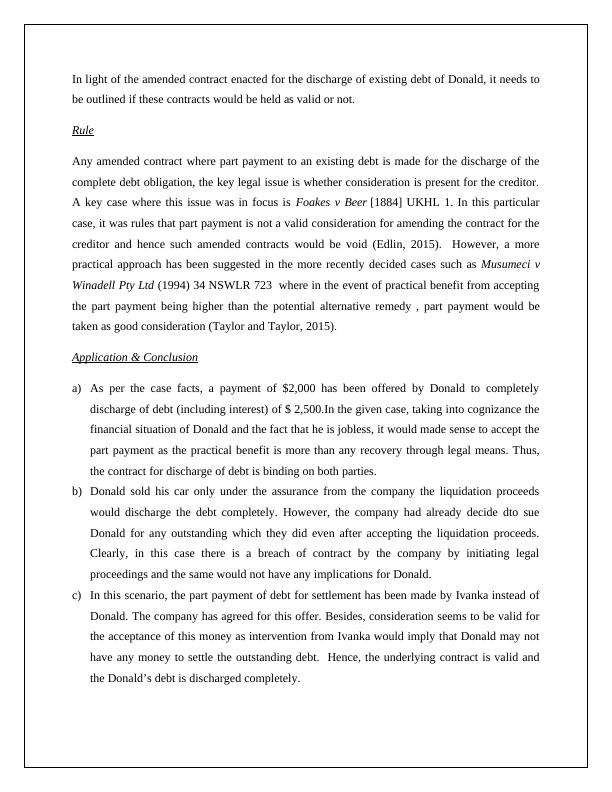Understanding Intention in Commercial and Social Agreements
Added on 2022-12-05
7 Pages1969 Words133 Views
BUSINESS LAW
STUDENT ID:
[Pick the date]
STUDENT ID:
[Pick the date]

Question 1
With regards to intention, the courts in the past have relied on legal precedents which have been
based on presumption in regards to differentiation in the treatment of social/domestic agreement
and commercial agreements. As indicated in the verdict of Jones v Padavatton [1968] EWCA
Civ 4, the intention element is assumed to be present by default in case of commercial
agreements but the opposite is assumed true for domestic/social agreements. This understanding
was put to test in the Ermogenous v Greek Orthodox Community case which provided an altered
legal course for judging the presence of intention in the Australian context (Andrews, 2014).
It was indicated by the High Court that the presumptions regarding intention based on the nature
of the agreement is quite distracting and tends to shift focus from the key case facts and
surrounding circumstances which should be used to judge if intention is present or not. Based on
the relevant case facts, the Full Bench gave the verdict holding the employment contract
unenforceable as they relied on the presumption related to agreement type to judge intention.
However, this was severely criticized by the High Court which considering the underlying
circumstances surrounding employment contract enactment and held it valid (Paterson,
Robertson and Duke, 2015).
Question 2
It is indicated in clause (a) that the underlying document does not give rise to any enforceable
legal relationship between concerned parties. Further, any dispute concerned with the underlying
document could not be decided in any court of law since the document does not fall within the
jurisdiction of any court of law (Gibson and Fraser, 2014).
It is indicated in clause (b) that any matter related to the underlying agreement cannot be
contested under any court which may be attributed to mutual agreement of alternative dispute
resolution mechanism by the concerned parties (Carter, 2015).
Question 3
Issue
With regards to intention, the courts in the past have relied on legal precedents which have been
based on presumption in regards to differentiation in the treatment of social/domestic agreement
and commercial agreements. As indicated in the verdict of Jones v Padavatton [1968] EWCA
Civ 4, the intention element is assumed to be present by default in case of commercial
agreements but the opposite is assumed true for domestic/social agreements. This understanding
was put to test in the Ermogenous v Greek Orthodox Community case which provided an altered
legal course for judging the presence of intention in the Australian context (Andrews, 2014).
It was indicated by the High Court that the presumptions regarding intention based on the nature
of the agreement is quite distracting and tends to shift focus from the key case facts and
surrounding circumstances which should be used to judge if intention is present or not. Based on
the relevant case facts, the Full Bench gave the verdict holding the employment contract
unenforceable as they relied on the presumption related to agreement type to judge intention.
However, this was severely criticized by the High Court which considering the underlying
circumstances surrounding employment contract enactment and held it valid (Paterson,
Robertson and Duke, 2015).
Question 2
It is indicated in clause (a) that the underlying document does not give rise to any enforceable
legal relationship between concerned parties. Further, any dispute concerned with the underlying
document could not be decided in any court of law since the document does not fall within the
jurisdiction of any court of law (Gibson and Fraser, 2014).
It is indicated in clause (b) that any matter related to the underlying agreement cannot be
contested under any court which may be attributed to mutual agreement of alternative dispute
resolution mechanism by the concerned parties (Carter, 2015).
Question 3
Issue

In light of the amended contract enacted for the discharge of existing debt of Donald, it needs to
be outlined if these contracts would be held as valid or not.
Rule
Any amended contract where part payment to an existing debt is made for the discharge of the
complete debt obligation, the key legal issue is whether consideration is present for the creditor.
A key case where this issue was in focus is Foakes v Beer [1884] UKHL 1. In this particular
case, it was rules that part payment is not a valid consideration for amending the contract for the
creditor and hence such amended contracts would be void (Edlin, 2015). However, a more
practical approach has been suggested in the more recently decided cases such as Musumeci v
Winadell Pty Ltd (1994) 34 NSWLR 723 where in the event of practical benefit from accepting
the part payment being higher than the potential alternative remedy , part payment would be
taken as good consideration (Taylor and Taylor, 2015).
Application & Conclusion
a) As per the case facts, a payment of $2,000 has been offered by Donald to completely
discharge of debt (including interest) of $ 2,500.In the given case, taking into cognizance the
financial situation of Donald and the fact that he is jobless, it would made sense to accept the
part payment as the practical benefit is more than any recovery through legal means. Thus,
the contract for discharge of debt is binding on both parties.
b) Donald sold his car only under the assurance from the company the liquidation proceeds
would discharge the debt completely. However, the company had already decide dto sue
Donald for any outstanding which they did even after accepting the liquidation proceeds.
Clearly, in this case there is a breach of contract by the company by initiating legal
proceedings and the same would not have any implications for Donald.
c) In this scenario, the part payment of debt for settlement has been made by Ivanka instead of
Donald. The company has agreed for this offer. Besides, consideration seems to be valid for
the acceptance of this money as intervention from Ivanka would imply that Donald may not
have any money to settle the outstanding debt. Hence, the underlying contract is valid and
the Donald’s debt is discharged completely.
be outlined if these contracts would be held as valid or not.
Rule
Any amended contract where part payment to an existing debt is made for the discharge of the
complete debt obligation, the key legal issue is whether consideration is present for the creditor.
A key case where this issue was in focus is Foakes v Beer [1884] UKHL 1. In this particular
case, it was rules that part payment is not a valid consideration for amending the contract for the
creditor and hence such amended contracts would be void (Edlin, 2015). However, a more
practical approach has been suggested in the more recently decided cases such as Musumeci v
Winadell Pty Ltd (1994) 34 NSWLR 723 where in the event of practical benefit from accepting
the part payment being higher than the potential alternative remedy , part payment would be
taken as good consideration (Taylor and Taylor, 2015).
Application & Conclusion
a) As per the case facts, a payment of $2,000 has been offered by Donald to completely
discharge of debt (including interest) of $ 2,500.In the given case, taking into cognizance the
financial situation of Donald and the fact that he is jobless, it would made sense to accept the
part payment as the practical benefit is more than any recovery through legal means. Thus,
the contract for discharge of debt is binding on both parties.
b) Donald sold his car only under the assurance from the company the liquidation proceeds
would discharge the debt completely. However, the company had already decide dto sue
Donald for any outstanding which they did even after accepting the liquidation proceeds.
Clearly, in this case there is a breach of contract by the company by initiating legal
proceedings and the same would not have any implications for Donald.
c) In this scenario, the part payment of debt for settlement has been made by Ivanka instead of
Donald. The company has agreed for this offer. Besides, consideration seems to be valid for
the acceptance of this money as intervention from Ivanka would imply that Donald may not
have any money to settle the outstanding debt. Hence, the underlying contract is valid and
the Donald’s debt is discharged completely.

End of preview
Want to access all the pages? Upload your documents or become a member.
Related Documents
Understanding Intention in Business Lawlg...
|7
|2014
|47
Business Lawlg...
|8
|1861
|84
Business Lawlg...
|9
|1933
|24
(Doc) Business Law Assignment - Solutionlg...
|8
|1720
|422
Business Lawlg...
|8
|1798
|79
Business Lawlg...
|7
|1146
|65
